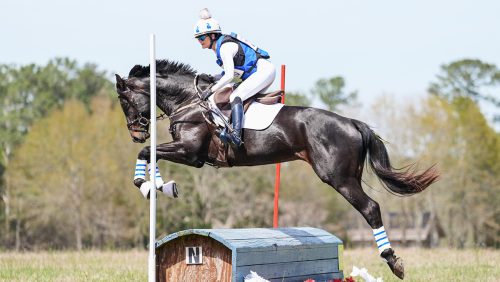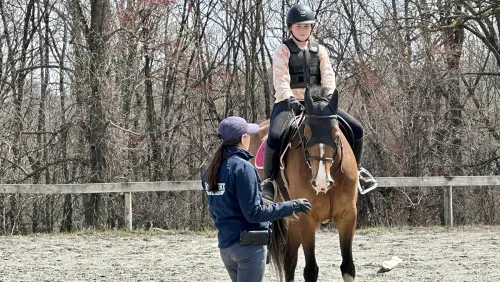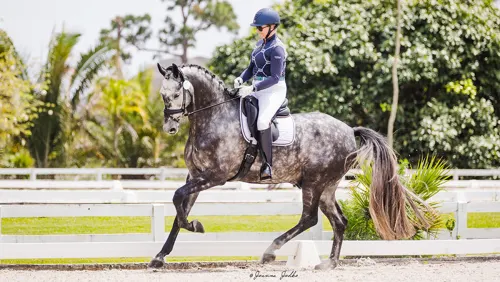I consider myself one of the 95% Ann Glavan references in her piece “95% Of Us Don’t Need The USEF.” I’d like to expound on her excellent essay by sharing my experience working with the U.S. Equestrian Federation to improve opportunities for the 95%.
In July of 2017, I wrote an open letter to Katie Prudent, which the Chronicle published online. In that open letter, I brought up a lot of the issues with accessibility in our sport for riders like me—riders with a lot of heart, passion and talent but without deep pockets.
While I never heard back from Ms. Prudent, I did hear from then-U.S. Equestrian Federation President Murray Kessler, who reached out to me personally. Mr. Kessler was seemingly receptive to the issues I brought up. Though he now sits in a privileged financial position, he explained that he came up in the sport at the grassroots level and had a passion for creating opportunities at all levels. Shortly after our personal interactions, Mr. Kessler invited me to serve on the USEF Grassroots Task Force.
As initially the sole amateur voice on that task force, I did my best to bring the perspective of the 95% of riders out there who, like me, desperately want to be able to participate in this sport and yet lack the deep pockets to do so. We had meetings and conversations; we debated definitions and tried to identify the true problems. We came up with ideas that would not solve the issues but would lay the foundation for some change and create some space for us to participate.

Jennifer Baas considers herself part of the 95% who can’t afford to regularly compete at rated competitions. Photo Courtesy Of Jennifer Baas
Initially, Mr. Kessler was involved in every meeting. He even hosted the group at his home in Wellington, Florida. Then, about the same time he accepted a position with another company, he stopped being personally involved in our meetings, and they were run by USEF CEO Bill Moroney.
Still, we met. We discussed. Those of us with more of the grassroots perspectives offered ideas that were continually pushed aside by the governing bodies’ representatives. We heard excuses for why they wouldn’t work or why it couldn’t be done.
ADVERTISEMENT
Interestingly, over a year into serving, I was suddenly required to join the USEF as a competing member in order to continue being on the task force, despite the fact I was not actively competing in USEF shows (because I could not afford them). I pushed back, but the USEF pushed harder. Wanting to stay involved, I paid the membership fee for the privilege to serve on a USEF task force that I was asked to join.
The meetings dwindled. The ideas and action items died on note pads. Then in mid-July 2020, after realizing it had been a long time since I’d heard anything from the USEF about the group, I reached out to see what the story was. And I was told that without specific renewal by the president, all advisory task forces operate for one-year terms, and our group had “automatically expired” on Jan. 1.
After my open letter, Mr. Kessler and Mr. Moroney and the entire task force seemed energized and dedicated to finding solutions for bringing more options to the grassroots. I and the other volunteers donated our time (and I personally paid for the pleasure of doing it). The USEF even did an entire presentation at the 2019 Annual Meeting about what we were doing and how we could bring some change.
And then apparently, the USEF’s interest in helping the 95% “automatically expired.”
I’ve bided my time and gone back to my non-existent space in the sport, but with the USEF’s recent reaction to the World Equestrian Center offering a few unrated weeks of showing alongside rated weeks, I cannot keep quiet. The 95% deserve to know the USEF’s real level of interest in them—or, disinterest, as it seems to be.
Since their focus on the grassroots “automatically expired” in January, I suppose it shouldn’t come as any surprise to us that they pulled WEC’s rated weeks’ licenses, ostensibly to force them to fall back in line with the mothership despite citing “health and safety concerns” (as if no one is capable of running a horse show with horse and human welfare in mind other than them). No, it seems clear that the USEF once again isn’t working FOR the majority it claims to serve.
ADVERTISEMENT
Because a USEF who is FOR the 95% would:
- Work with WEC. It would see their offerings of unrated weeks as an opportunity for the 95% to play in a sandbox they aren’t usually allowed in.
- Stay involved in expanding opportunities for less wealthy riders.
- Understand that there is value in listening to our voices.
- Believe that creating space for us in the sport does nothing but help it grow and flourish and feed the top. Because the top of a pyramid without a base will eventually crumble and fall.
But the USEF is working for the 5%. The 5% who can pay to play regardless of how expensive the sport is or becomes. The same 5% who are at every show, winning at every championship show. That’s the USEF’s market. And that’s fine, but they should be honest about it.
What the 95% lacks in money we more than have in numbers, and we’re flat out tired of being treated as if we aren’t good enough, as if we don’t belong, as if we are less-than, because we can’t afford the equal footing we deserve—footing based on talent and ability and hard work rather than dollar signs.
So I encourage the 95% to take their lead from the USEF. What’s the saying? “When someone shows you who they are, believe them.” Believe who the USEF has shown themselves to be and stop waiting for them to create an accessible sport for us. They could influence great change, but in absence of that, we can create our own.
And perhaps that starts with WEC offering its 12 weeks of shows run by the National Snaffle Bit Association where we don’t have to pay USEF fees or stall fees in order to show at a lovely facility. Shows that will be less expensive and more accessible—which is all we’ve been asking for from the beginning.
Jennifer Baas is a lifetime hunter/jumper rider and former professional-turned-amateur residing in Colorado with her husband, son, horses and dogs. Jennifer is a fierce advocate for her fellow horsewomen and men and founded the Riders Coalition, an organization dedicated to being a voice for riders who struggle to find a visible presence within the modern horse show industry. She began blogging for the Chronicle in 2018.














